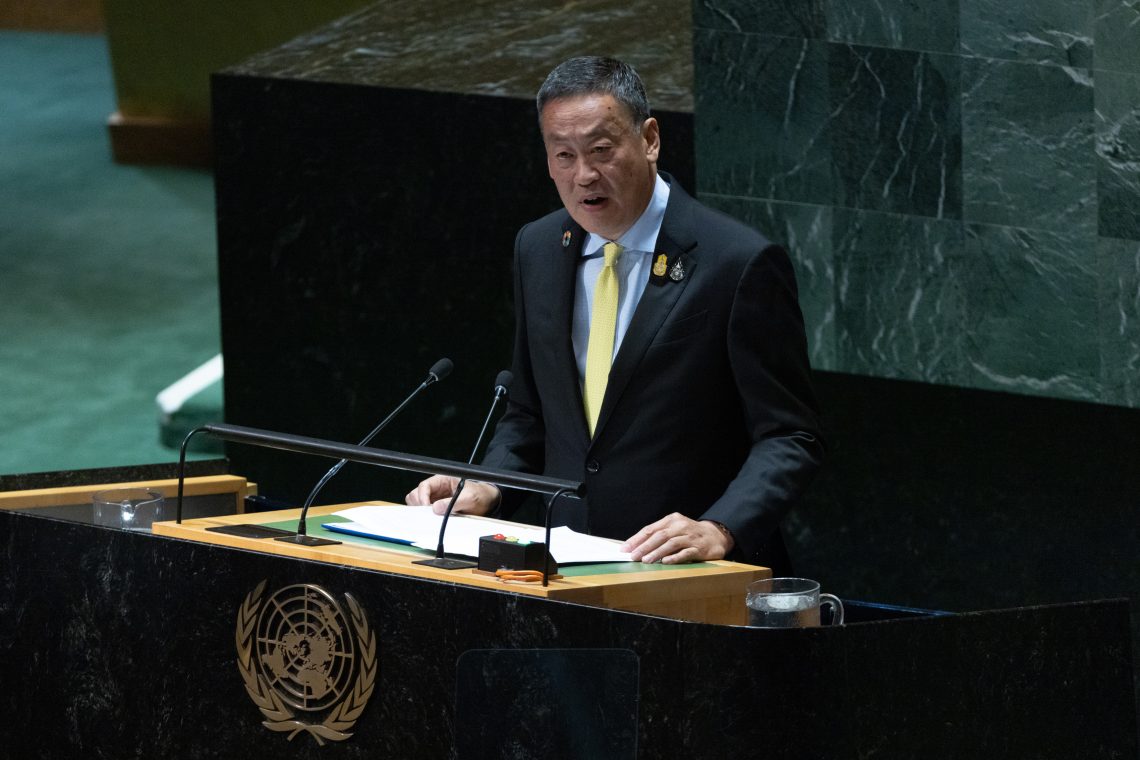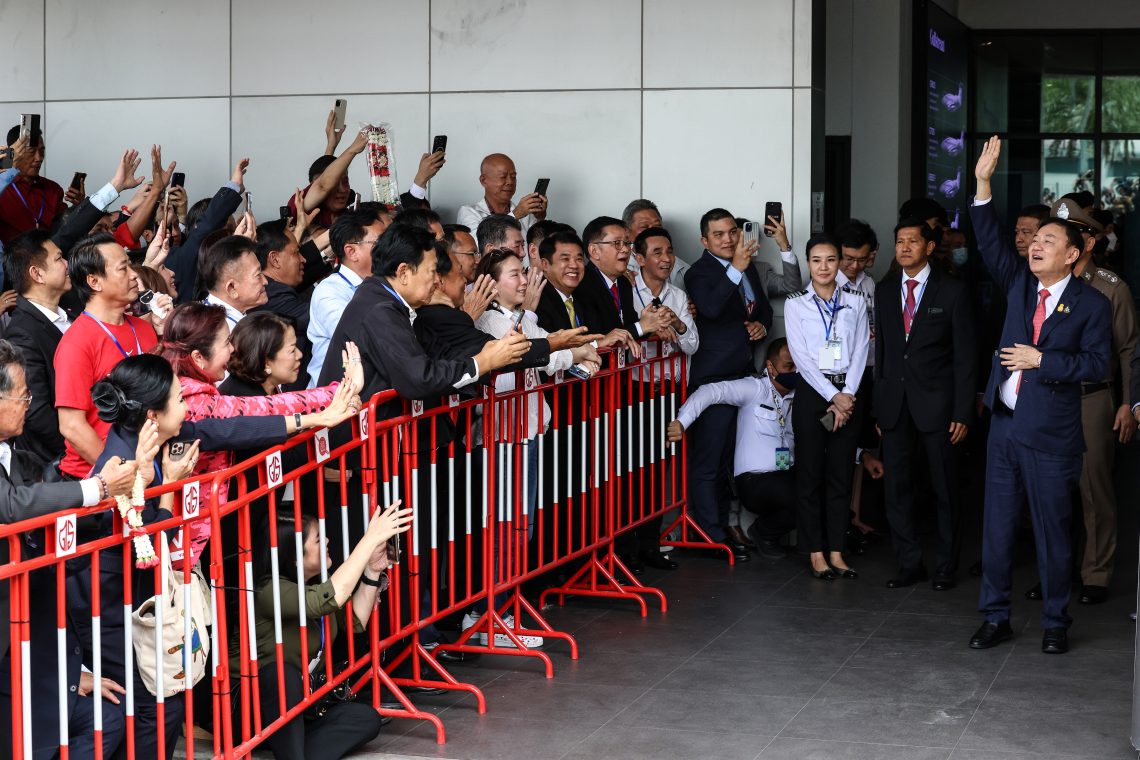Thailand’s foreign policy vision collides with reality
Thailand’s new prime minister has laid out an ambitious diplomatic agenda, but it will run up against domestic inertia and larger geopolitical dynamics.

In a nutshell
- Bangkok seeks new trade deals and regional projects
- U.S.-China tensions and economic headwinds will pose obstacles
- The new premier also faces domestic political turmoil
Since taking office in September 2023, Thai Prime Minister Srettha Thavisin has advocated a new foreign policy vision of “proactive diplomacy,” designed to boost the country’s economic prospects and its influence in a turbulent world. This has been closely watched by observers given Thailand’s status as Southeast Asia’s second-largest economy, among the world’s 20 most populous countries and a traditional U.S. treaty ally supporting regional security cooperation. The critical question is how far Thailand can sustain this vision amid a confluence of external challenges and long-simmering internal political contestation.
External environment
Since his appointment after months of maneuvering following the May 2023 polls, Mr. Srettha has been quick to lay out his diplomatic approach in engagements at home and abroad. This so-called proactive diplomacy has focused on securing new free trade agreements, leveraging the country’s soft power and promoting key infrastructure projects, including a proposed land bridge linking the Indian and Pacific Oceans.
The impetus for Mr. Strettha’s vision partly came from the sense that Thailand is lagging behind neighbors after years of being consumed by domestic politics, including a decade spent under a military-led government following a May 2014 coup. During this time, the external environment has also become more difficult for Thailand, between the Covid-19 pandemic, shifting supply chains, intensifying United States-China competition and a civil war in neighboring Myanmar. This environment has put greater scrutiny on some of Bangkok’s foreign policy decisions, including an embattled submarine deal with China, a hedged approach to the Russia-Ukraine war and even the case of Thais abroad held hostage in the Israel-Gaza conflict.
Despite the merits of Mr. Srettha’s proactive diplomacy vision, it faces obstacles. A businessman by background, the prime minister sees himself as leading a “Team Thailand” looking to boost the country’s international image and foster foreign ties. But the reforms necessary to do so will require not just sales pitches and soft power but also political support and solutions to issues of structural competitiveness. These are not easy objectives and will take time even in the best-case scenario.
More from Prashanth Parameswaran
- Myanmar rebels seek to topple the military junta
- Indonesia’s foreign policy after the 2024 presidential elections
- Beijing’s claims in the South China Sea roil the Philippines
Domestic turmoil
At home, Prime Minister Srettha has already found that in some cases, overhauling parts of Thailand’s foreign and economic policymaking processes will have to be mediated through established procedures and mechanisms – which may be slower than he would like. Abroad, he may also struggle to find support for ambitious projects, especially as many other Southeast Asian governments are also looking to position themselves across sectors in the race for post-pandemic growth.
As Thailand heads deeper into 2024, how far can Mr. Srettha’s foreign policy vision go? On one hand, Thailand’s economic growth has been projected to pick up this year. The government has also outlined initiatives for the first half of 2024, including boosting ties with Washington and inking new free trade pacts. This could add momentum to his proactive diplomacy approach.

On the other hand, efforts to drum up support for new investment face headwinds, as the global economy is set for its weakest half-decade in 30 years, according to the World Bank. Domestic political dynamics and questions around the prime minister’s position within the coalition government and his Pheu Thai party could also derail his goals. Former Prime Minister Thaksin Shinawatra, who founded Pheu Thai and has clashed with the monarchy and ruling military since the 2000s, last year engineered a dramatic return from exile.
Even if Mr. Srettha does stay in power, there are risks of political turmoil – including around the moves of progressive forces and their supporters, who performed well in Thailand’s May 2023 elections but were outmaneuvered in forming a government.
Scenarios
Most likely: Adjustments
Three scenarios are possible. In the most likely, Thailand would not depart too far from its recent foreign policy trajectory but would achieve some select, incremental changes consistent with the government’s vision of proactive diplomacy. In mainland Southeast Asia, this would include new multilateral efforts designed to reinforce the country’s position as a regional hub, including more cooperation on tourism initiatives with Cambodia, Laos and Vietnam. Thailand would also intensify subregional cooperation on certain longstanding issues, such as protections for migrant workers and transboundary pollution.
Beyond Southeast Asia, Thailand would place a greater focus on attracting investment from major powers like Japan and the U.S. to better balance its growing economic reliance on China, even as it continues to pursue episodic cooperation with Beijing. Opportunities may build on existing priorities designed to better position Thailand in the pursuit of post-pandemic growth, including electric vehicles, energy, innovation and supply chains.
Less likely: Snapback
Under a second scenario, Thailand would revert to a more reactive, domestic-focused foreign policy approach as it becomes consumed by political turbulence and uncertainty. Evolving political dynamics behind the scenes would lead to either a leadership change or shifts in the balance of power within the current coalition.
A snapback scenario would still see Thailand pursue some initiatives already in place, like attracting foreign investment into its eastern provinces or promoting its cooperation framework for the Mekong subregion, the Ayeyawady-Chao Phraya-Mekong Economic Cooperation Strategy (ACMECS). But the country’s foreign policy focus would align with the short-term domestic interests of the ruling regime. This could result in transactional initiatives like more defense deals with China – sparking American anxieties about the state of the U.S.-Thai alliance even if it does not signal a broader strategic shift. And this dynamic would intensify if democratic backsliding leads to new strains in the ruling alliance, as happened following the 2014 coup.
Least likely: Overhaul
In a third scenario, Thailand would realize a fuller implementation of proactive diplomacy. This is least probable, given the continuity of its foreign policy contours over the past few decades and the realities of competing domestic power centers. But if it does materialize, Thailand’s “proactivity” would manifest not just in economic and diplomatic areas, but also in a wider geopolitical and global sense.
A more dedicated Thai leadership would do more to manage Myanmar’s civil war in concert with powers like the U.S. And it could pursue a more sustained strategy to resolve the decades-long insurgency in southern Thailand, beyond sporadic talks and economic initiatives facilitated by Malaysia. The government could also sharpen the intersection between its proactive diplomacy vision and issues like U.S.-China competition and the rise of artificial intelligence, especially in key fora such as the United Nations, the World Economic Forum and the Association of Southeast Asian Nations.
For industry-specific scenarios and bespoke geopolitical intelligence, contact us and we will provide you with more information about our advisory services.









